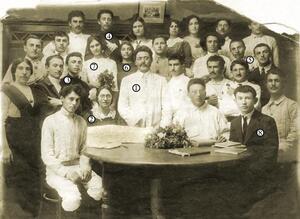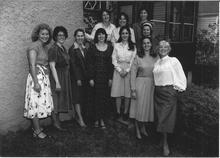Hephzibah Menuhin
Courtesy of Tamar Eshel.
Hephzibah Menuhin had a stellar career as a pianist and human rights activist. Menuhin was fluent in seven languages and gave her first piano recital at age eight. She and her brother Yehudi performed internationally and won the Candide prize for their music. Menuhin’s parents pressured her to marry, so she briefly put aside her career to settle down, but the marriage ended in divorce and she returned to performing. Menuhin visited Theresienstadt and was moved to begin working for human rights. In 1955, she married sociologist Richard Hauser and they founded the Institute for Human Rights and Responsibilities and began running a human rights refuge out of their home in England. In 1977 she became president of the Women’s International League for Peace and Freedom.
Early Life and Family
Hephzibah Menuhin, a pianist and social activist, was born in San Francisco on May 20, 1920, the second of three children. Her parents, Moshe and Marutha (Sher) Menuhin, were Russian Jews who came to the United States by way of Palestine. Neither Moshe nor Marutha was a trained musician, but all of their children—Yehudi, Hephzibah, and Yaltah—showed extraordinary musical gifts. Moshe was a student of mathematics and a Hebrew teacher before he gave his full time and energy to managing his son Yehudi’s career as a violinist. Marutha also taught Hebrew before she devoted herself to rearing her family. Hephzibah’s education, like her brother’s and sister’s, was entirely entrusted to her parents and private tutors. She studied piano with Judith Blockley and Lev Schorr in San Francisco, Marcel Ciampi in Paris, and Rudolf Serkin in Basel. She was also an accomplished linguist, having mastered Hebrew, English, French, German, Italian, Spanish, and Russian by her teen years.
Performance Career
Menuhin’s debut recital, at which she played works of Beethoven, Bach, Chopin, and Weber, took place in San Francisco in 1928, when she was eight years old. In 1933, she and her brother recorded the Mozart Violin Sonata in A. This recording won the Candide prize for the best recording made in France that year. The prize money was donated to charity. The next year, Hephzibah and Yehudi began to perform together, giving one concert in Paris, one in London, and one in New York. Reviewers were in agreement that Hephzibah’s talent as a pianist equaled that of her world-renowned virtuoso violinist brother, but the Menuhin parents were determined that Hephzibah’s public appearances would be strictly limited. Her mother told an interviewer for the San Francisco Chronicle, “Hephzibah yearns for solo recitals and a career of her own.... I tell her that the only immortality to which a woman should aspire is that of a home and children.” The youngest Menuhin child, Yaltah, also a skilled pianist, did not perform publicly in her youth at all.
First Marriage and Australia
The Menuhin parents were less vigilant in protecting their children from early marriages to people with whom they were only slightly acquainted. In 1938, when Yehudi was twenty-two, Hephzibah was eighteen, and Yaltah was sixteen, all three Menuhin children married. These marriages all ended in divorce. Hephzibah’s husband, Lindsay Nicholas, was the son of a millionaire Australian analgesic manufacturer and the owner of a 24,000-acre sheep ranch. His sister, Nola Nicholas, was Yehudi’s first wife.
Hephzibah spent most of the 1940s in Australia, rearing her two sons, Kronrod and Marston, and concertizing. She liked to perform with chamber groups and with orchestras, and was a persuasive advocate for contemporary music, introducing, among other works, the Bartok piano concerti to Australia. In addition, she founded the first traveling library in Australia to bring works to the Outback. In 1947, after a hiatus of almost a decade, she once again began concertizing with her brother. They gave a series of concerts in Israel in 1950; they also performed together in many cities in the United States and throughout Europe
Activist Work and Legacy
After World War II, Hephzibah’s marriage to Lindsay Nicholas ended. She married Vienna-born sociologist Richard Hauser and their daughter, Clara, was born in 1956; the family later moved to England. With her husband, Hephzibah worked to assist the poor, the homeless, and those recently ill. She also worked for the causes of peace and disarmament, serving as president of the Women’s International League for Peace and Freedom.
Hephzibah Menuhin died at age sixty in 1981, after a long battle with cancer. Her legacy of recordings includes performances of works by Bach, Mozart, Beethoven, Schumann, Brahms, Franck, and Enesco. She is also remembered for her devotion to the needy and suffering.
EJ, s.v. “Menuhin, Yehudi”.
Magidoff, Robert. Yehudi Menuhin: The Story of the Man and the Musician (1955).
Menuhin, Moshe. The Menuhin Saga: The Autobiography of Moshe Menuhin (1984).
Menuhin, Yehudi. Unfinished Journey (1977).
NYTimes, January 2, 1981.
Palmer, Tony. Menuhin: A Family Portrait (1991).
Rolfe, Lionel Menuhin. The Menuhins: A Family Odyssey (1978).
UJE, s.v. “Menuhin, Yehudi”.
Wymer, Norman. Yehudi Menuhin (1961).




